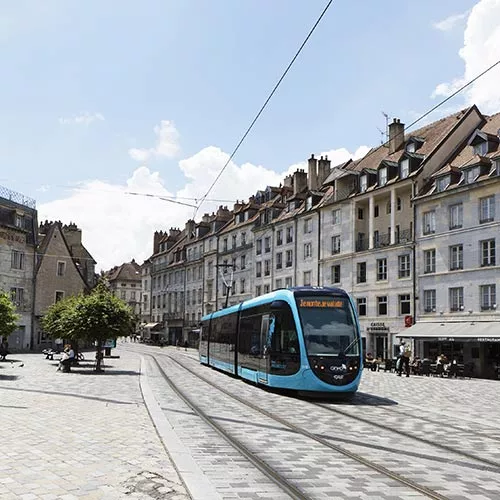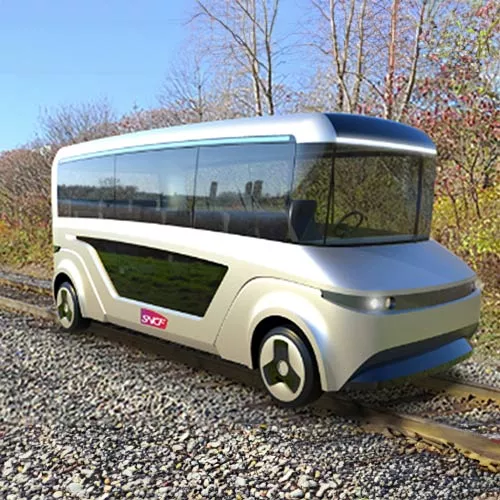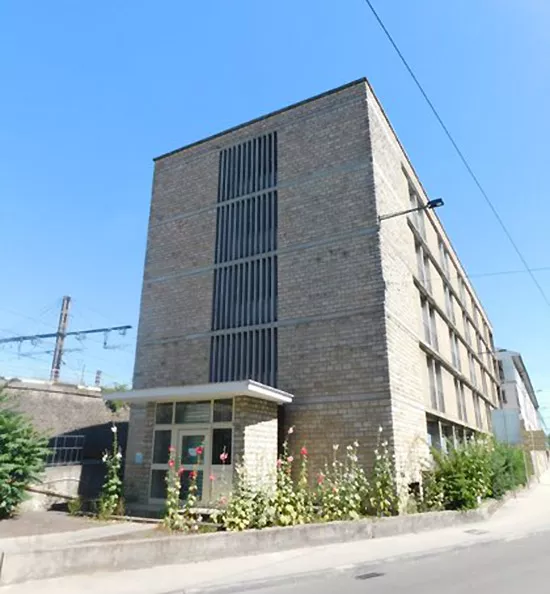Connecting regions across France: Burgundy-Franche-Comté
Find out how we support thousands of jobs in the region and work with all our stakeholders to make lives better.
We contribute to the region’s economic growth

10,105
SNCF Group employees in 2024

€350m
in purchases from local suppliers

70%
of our suppliers—723 in all—are SMEs and very small businesses
How Castmetal produces innovative disc brakes
At Colombier-Fontaine, in the Castmetal foundry in Burgundy-Franche-Comté, temperature rises to over 1,600 degrees in the furnace when casting a part that is essential to the smooth running of our trains: the disc brake. And not just any kind of disc brake! Designed by our partner, in collaboration with our teams at the Centre d'Ingénierie Matériel (CIM) in Le Mans, these innovative discs, made from 98% recycled material, can be changed without removing the wheel from the trains. Let’s take a look back at their meticulous and impressive manufacturing process.
In Burgundy-Franche-Comté, in the Castmetal foundry in Colombier-Fontaine
Developing rail freight
In 2024, our Rail Logistics Europe team at the Mâcon site in the Saône-et-Loire department carried 2.7 million tonnes of goods in the region—a strategic crossroads and hub for rail-motorway development and transit.
A biofuel tank for rail freight
SNCF Réseau and Europorte have joined forces and installed a 100% plant-based fuel tank at the Gevrey-Perrigny site in Bourgogne-Franche-Comté. It will supply the rail operator's engines. This innovation in favor of the decarbonization of freight transport is a first in France.
Actively enhancing quality of life in the region

Sustainable public transport
Keolis runs the entire public transport system for the Besançon metropolitan area and will continue expanding service under a new 7-year contract signed in 2024. The Ginko network serves 200,000 people in 68 communities. Upcoming plans include adding 5 new trams purchased by local transport authorities and expanding bike-share and long-term bike rental services. Our aim is to reach 23.3 million de passengers annually by 2031.

FLEXY revives little-used lines
Our innovative rail-to-road system FLXEY, uses versatile CARFLEX electric shuttles to serve smaller lines. This shuttle can be configured to suit a variety of needs, including carrying bicycles or small freight, and accommodates up to 14 passengers. Equipped with Michelin-patented tyres, it transitions seamlessly from rail tracks to roads.
FLEXY is designed for lines that could support 350 to 500 passengers a day, making it ideal for connecting people in smaller, remote towns to the rail network. A pilot programme will be launched on a test line in Bourgogne-Franche-Comté in 2025.
A modern rail network
SNCF Réseau is working hard to make sure rail infrastructure in the region is safe and reliable.
Current works include:
- Upgrading signalling equipment between Fain-Lès-Montbard and Nuits-sous-Ravières at a cost of €118 million.
- Replacing track, level crossings and two platforms, as well as securing bridges between Nevers and Cosne-Cours-sur-Loire for a budget of €106 million.
- Upgrading track between Clerval and Belfort for €22 million.
- Upgrading track between Besançon and Laissey for €20 million.
France’s first rail recycling centre
The easiest waste to treat is the waste you don’t create: that’s the rallying cry at our recycling center in Beaune, in the Côte-d’or department. The site refurbishes and repurposes rail products, giving a second life to items that would have been landfill. Altogether it handles some 1,500 product categories representing goods that would cost €1.4 million to produce new. Which is great for the environment and for our bottom line. But it also benefits the local population by employing 12 workers on contracts specifically intended for people who have struggled to find jobs.
SNCF Réseau supports the circular economy with its rail recycling centre in Beaune

Using our property portfolio to help the most vulnerable
We’ve converted 500 sq m of our Arquebuse building in Dijon—formerly a dormitory for rail workers—into 15 emergency housing units, available for short-term or long-term stays. Our partner in the project, Dijon-based non-profit ADEFO, also helps residents enter the job market.
We’re renovating 160 homes in Dijon
We’re working on an energy efficient renovation project at the ZUP du Lac residential complex in Dijon, eastern France. Led by SNCF Group’s social housing landlord, project owner ICF Habitat, the retrofit is designed to boost the energy performance of 1970s homes to BBC-Rénovation level. New thermal and roof insulation, radiators and joinery will all play a role. 100 units have been delivered to date. With a planned completion date of end-2025, the €11 million project is cofunded by ICF Habitat, Dijon Métropole and the Bourgogne-Franche-Compté region. These energy upgrades are part of a large-scale overhaul of ICF Habitat’s housing portfolio in Dijon that will run over 10 years and see 68% of our total stock refurbished—11 residential buildings representing 893 housing units.
PIMMS outreach centres forge closer social ties
Since 2011, we’ve provided space in Chauffailles station for PIMMS, a multi-service mediation agency. This non-profit helps people access public services and benefits, complete online tasks, and purchase train tickets. The arrangement was facilitated by our Place de la Gare project.
Promoting rail safety
During the 2023-24 school year, SNCF employees in our IMS outreach programmes taught rail safety to 4,620 school children between the ages of 9 and 18 in Bourgogne-Franche-Comté.
Serving local communities through the SNCF Foundation
In Bourgogne-Franche-Comté, SNCF Foundation collaborates with associations supporting young people living in rural and metropolitan areas. We help them find jobs by funding educational and environmental initiatives, such as production schools for instance, that offer guidance and training in manual as well as intellectual jobs.
We also aim to raise young people's awareness about the environment and to give them job opportunities, thus contributing to a greener, more inclusive future.
Share the article